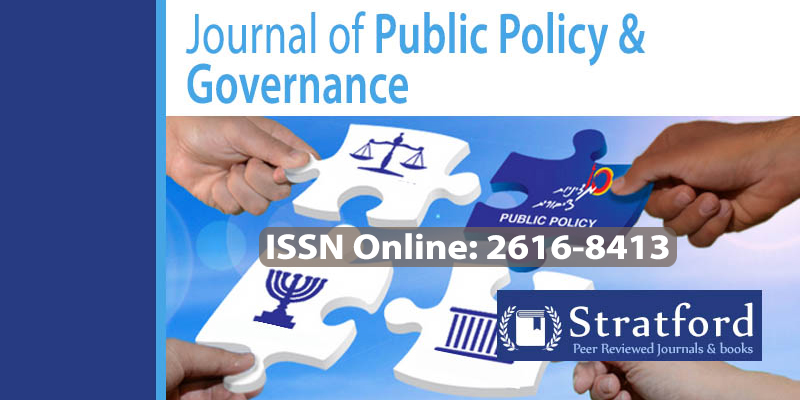Digital Technologies and Transformation of Governance Processes: A Study of Syddanmark Regional Council in Denmark
DOI:
https://doi.org/10.53819/81018102t5224Abstract
Digital technologies have revolutionized governance processes by enhancing efficiency, transparency, and citizen engagement. The adoption of e-governance platforms and online services has streamlined administrative procedures, making government services more accessible and convenient for citizens. Data-driven decision-making has enabled evidence-based policy interventions and targeted service delivery. Online platforms for public consultations have empowered citizens to participate in decision-making processes and fostered a sense of inclusivity. The successful transformation of governance processes through digital technologies requires addressing challenges such as the digital divide, data privacy, cybersecurity, and continuous evaluation to ensure the benefits are maximized and the potential risks are mitigated. The study findings reveal that the adoption of digital technologies has brought several significant benefits to governance processes in the Regional Council. Efficiency has improved through the implementation of e-governance platforms and online services, reducing administrative burdens and enabling streamlined service delivery. The study also highlighted cybersecurity and data privacy as critical concerns. The regional council should continually invest in robust security measures to safeguard sensitive information and protect against potential cyber threats. The study concluded that the digital transformation of governance processes in the Council has yielded significant improvements in efficiency, transparency, citizen engagement, and accountability. The adoption of digital technologies, such as e-governance platforms, online services, and data-driven decision-making, has streamlined administrative procedures, enhanced service delivery, and empowered citizens to actively participate in governance. The study recommended that the regional council should prioritize efforts to bridge the digital divide and ensure equal access to digital technologies and internet connectivity. Training and educational resources should be provided to improve digital skills, increase awareness of online services, and promote responsible digital citizenship.
Keywords: Digital Technologies, Transformation, Governance, Denmark
References
Almagtome, A., Khaghaany, M., & Önce, S. (2020). Corporate governance quality, stakeholders' pressure, and sustainable development: An integrated approach. International Journal of Mathematical Engineering and Management Sciences, 5(6). https://doi.org/10.33889/IJMEMS.2020.5.6.082
Danielle, D. (2021). A study of the cleantech technological innovation systems in Copenhagen and London and the role of innovation intermediaries: a case study of Clean Tech London and the CLEAN cluster Denmark.
Dwivedi, Y. K., Hughes, L., Kar, A. K., Baabdullah, A. M., Grover, P., Abbas, R., ... & Wade, M. (2022). Climate change and COP26: Are digital technologies and information management part of the problem or the solution? An editorial reflection and call to action. International Journal of Information Management, 63, 102456. https://doi.org/10.1016/j.ijinfomgt.2021.102456
Goran, R., Ye, K. N., & Yu, F. Y. (2021). Opportunities for sustainable economic development of the coastal territories of the Baltic Sea region in the context of digital transformation. Baltic Region, 13(S2), 7-26. https://doi.org/10.5922/2079-8555-2021-2-1
Hariguna, T., Ruangkanjanases, A., & Sarmini. (2021). Public behavior as an output of e-government service: the role of new technology integrated in e-government and antecedent of relationship quality. Sustainability, 13(13), 7464. https://doi.org/10.3390/su13137464
Manita, R., Elommal, N., Baudier, P., & Hikkerova, L. (2020). The digital transformation of external audit and its impact on corporate governance. Technological Forecasting and Social Change, 150, 119751. https://doi.org/10.1016/j.techfore.2019.119751
Mensah, I. K., Zeng, G., & Luo, C. (2020). E-Government services adoption: an extension of the unified model of electronic government adoption. Sage Open, 10(2), 2158244020933593. https://doi.org/10.1177/2158244020933593
Mohamed, Z. E., & Saad, M. (2022). The Impact of Digital Transformation and Corporate Governance in the Relationship of Strategic Management Practices and the Firm’s Performance: The Case of the Malaysian Petroleum Sector. Journal of Business, 10(4), 192-209.
Mulyana, R., Rusu, L., & Perjons, E. (2021). IT Governance Mechanisms Influence on Digital Transformation: A Systematic Literature Review. In Twenty-Seventh Americas' Conference on Information Systems (AMCIS), Digital Innovation and Entrepreneurship, Virtual Conference, August 9-13, 2021 (pp. 1-10). Association for Information Systems (AIS).
Ohkubo, K. (2019). Cybersecurity Technologies Essential in the Digital Transformation Era. International Journal of Informatics Society (IJIS), 11.
Owen, R., Vedanthachari, L. N., & Hussain, J. (2023). The role of the university entrepreneurial ecosystem in entrepreneurial finance: case studies of UK innovation knowledge centres. Venture Capital, 1-25. https://doi.org/10.1080/13691066.2023.2205606
Przeybilovicz, E., Cunha, M. A., Geertman, S., Leleux, C., Michels, A., Tomor, Z., ... & Meijer, A. (2022). Citizen participation in the smart city: findings from an international comparative study. Local government studies, 48(1), 23-47. https://doi.org/10.1080/03003930.2020.1851204
Randall, L., Ormstrup Vestergård, L., & Wøien Meijer, M. (2020). Rural perspectives on digital innovation: Experiences from small enterprises in the Nordic countries and Latvia. https://doi.org/10.6027/R2020:4.1403-2503
Todoruţ, A. V., & Tselentis, V. (2018). Digital technologies and the modernization of public administration. Calitatea-Acces la Success, 19(165), 73-78.
Vabø, M. (2022). Norwegian home care in transition–heading for accountability, off‐loading responsibilities. Health & social care in the community, 20(3), 283-291. https://doi.org/10.1111/j.1365-2524.2012.01058.x
Viale Pereira, G., Estevez, E., Cardona, D., Chesñevar, C., Collazzo-Yelpo, P., Cunha, M. A., ... & Scholz, R. W. (2020). South American expert roundtable: increasing adaptive governance capacity for coping with unintended side effects of digital transformation. Sustainability, 12(2), 718. https://doi.org/10.3390/su12020718
Xu, C., Chen, X., & Dai, W. (2022). Effects of Digital Transformation on Environmental Governance of Mining Enterprises: Evidence from China. International Journal of Environmental Research and Public Health, 19(24), 16474. https://doi.org/10.3390/ijerph192416474


